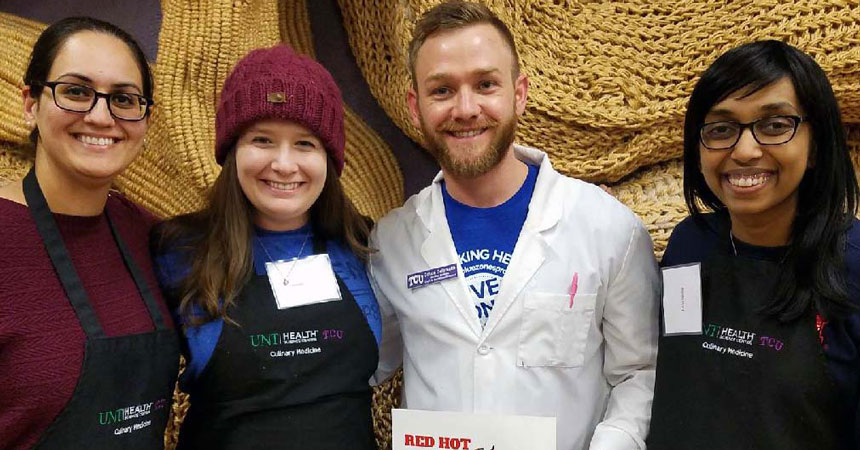Culinary Medicine students keep momentum going
By Betsy Friauf

For several years, the Culinary Medicine course has fed students’ passion to help patients eat healthier.
Now, it also stokes their enthusiasm for interprofessional collaboration that extends beyond the classroom and into summer.
The TCOM elective course was first offered in 2014, the first of its kind in Texas and one of only about a dozen around the country.
It prepares our future health care providers to counsel their patients on exactly how to modify their favorite foods so they’re more healthful but still affordable.
The course is offered to first-year TCOM, physician assistant and pharmacy students, who then collaborate with dietitian students from Texas Christian University.
Students who recently finished the course created a way to keep the momentum going.
They’re planning a six-week social media blitz this summer to share photos and recipes of their innovative, healthy home-prepared meals.
The plan, still in the works, is that the person with the most “likes” gets a prize.
That’s not all.
“Once the competition is over, we could compile all of the recipes on Pinterest with the calculated calories, macronutrients, and other information,” said Austin Wolstein, MS, a first-year TCOM student.
Culinary Medicine brings the UNTHSC and TCU students together for hands-on lessons that turn the kitchen into a classroom. They work in teams to create dishes using specified ingredients and meet guidelines for nutrition, presentation and other qualities crucial to healthy eating habits.
Culinary Medicine is taught by registered dietitian Debbie Gillespie, MS, Lifestyle Health Sciences, School of Health Professions; and Associate Medical Professor Janet Lieto, DO, from TCOM, in collaboration with registered dietitians Lyn Dart, PhD and Anne VanBeber, PhD, from the Department of Nutritional Sciences at TCU.
Students learn how to translate nutritional science to the plate and gain culinary skills in the TCU kitchen lab. As a result, they’re better able to understand how food choices and preparation impact chronic disease risk and overall health.
First-year TCOM student Amanda Seemann says the course helps her “take the information I learned in class and apply it to real-life scenarios. I’ll feel more confident discussing dietary changes with my future patients.”
Wolstein is so inspired that he’s seeking to start a new student organization centered on culinary med, and says, “I’m open to any suggestions on moving this forward!”





Social media